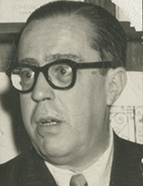

It is worth noting, however, that Holanda opposed not only Cortesão’s position but also the geographical ideology of the Paulista historiographical school. Promoted by his former mentor Affonso Taunay and other historians from the São Paulo Historical and Geographical Institute, this school played a prominent role in organising the grandiose celebrations of São Paulo’s IV Centenary. Holanda repeatedly criticised these currents for their veneration of the bandeirantes and their portrayal of São Paulo as isolated and peripheral to the Atlantic trade system. Drawing on the most advanced ethnographic and anthropological theories of his time, Holanda sought to explain the foundations of Paulista expansion by examining material evidence, forest-gathering techniques, cultivation methods, food preparation, the production of clothing and tools, and the population movements across the São Paulo plateau.
Between 1946 and 1967, Holanda’s career as a historian became firmly international through a network of connections with colleagues in France, Belgium, Portugal, Spain, Mexico, Uruguay, Peru, Chile, and the United States. From 1949, he strengthened ties with French universities, delivering lectures at the École Pratique des Hautes Études (invited by Fernand Braudel) and the Sorbonne (invited by Lucien Febvre). From 1948, he participated in various UNESCO committees, contributing to a significant post-war inquiry into the concept of democracy and attending international colloquia on the originality of civilisations.
In 1950, Holanda returned to the United States as part of the Brazilian delegation to the First International Colloquium on Luso-Brazilian Studies , held by the Library of Congress in Washington, where he presented his research on 18th-century Brazilian agricultural techniques. During the same visit, he participated in seminars at Columbia University at the invitation of Frank Tannenbaum (1883–1969), a prominent historian of American slavery. From 1952 to 1954, Holanda held the Chair of Brazilian Studies at the University of Rome, attended UNESCO-organised meetings, and was elected to the International Council of Museums (ICOM), participating in meetings in Paris, Geneva, and Rome with curators of historical collections. Upon his return to São Paulo, Holanda became director of the Museu Paulista in 1955 and deputy director of the São Paulo Museum of Modern Art in the same year. By this time, Raízes do Brasil had been translated into Italian ( Fratelli Boca Editori ) and Spanish ( Fondo de Cultura Económica ), incorporating revisions and an expansion of approximately 100 paragraphs compared to the original 1936 edition.
This work is financed by national funds through FCT - Foundation for Science and Technology, I.P, in the scope of the projects UIDB/04311/2020 and UIDP/04311/2020.
